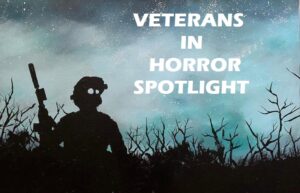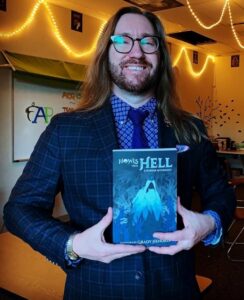
 Solomon Forse is the founder of HOWL Society, the most active online horror book club on the web. He also plays guitar in the Lovecraftian metal band Crafteon and teaches high school English on the western slope of the Rocky Mountains. Check out his latest fiction appearing in the Howls From Hell anthology, MYTHIC Issue 20, Boneyard Soup Magazine Vol. 1, Issue 4., and Into the Crypt of Rays: A Black Metal Horror Anthology. Follow him on Twitter @SolomonForse.
Solomon Forse is the founder of HOWL Society, the most active online horror book club on the web. He also plays guitar in the Lovecraftian metal band Crafteon and teaches high school English on the western slope of the Rocky Mountains. Check out his latest fiction appearing in the Howls From Hell anthology, MYTHIC Issue 20, Boneyard Soup Magazine Vol. 1, Issue 4., and Into the Crypt of Rays: A Black Metal Horror Anthology. Follow him on Twitter @SolomonForse.
Tell us a bit about your military service. Years? Branch? Specialty?
I served as an infantryman for the US Army from 2007-2010. I was stationed in Fort Wainwright, Alaska, and completed one combat tour in the Diyala province of Iraq from 2008-2009. During my deployment, I carried a grenade launcher for about five months until my leadership switched me to RTO, or radio telephone operator–the soldier you see in war movies with the giant radio backpack and an old-fashioned telephone-style receiver on their shoulder.
What role, if any, did reading and writing play during your military service?
Though I’ve done nothing with it just yet, I kept a weekly journal of my experiences both in garrison and at war. I have plans for a military horror novel based on the dozens of stories I recorded during those times, but for now it’s just in the outlining stage. Even though it all happened over a decade ago, I still need a bit more emotional distance before I sit down to write it.
As for reading, I almost always kept a novel in the cargo pocket of my uniform trousers. The military is notorious for the “hurry up and wait” dilemma. Oftentimes I’d find myself sitting around for hours waiting for orders to come down from leadership, and there’s no better cure for boredom than a book. Besides, serving in the infantry–where you can qualify with what is essentially a failing score on the ASVAB test–losing my vocabulary was a daily threat considering the types of soldiers I served with (great people, just not great language), so reading books ensured I didn’t lose my lexicon.
What inspired you to start writing?
After serving in the military, I used my GI Bill to earn both a bachelor’s and master’s degree in English. I went on to teach high school language arts courses for eight years and thereby developed the confidence to try writing fiction myself.
What was it about the horror genre that drew you to it?
In my teenage years I became addicted to scaring myself to sleep. By this I mean reading stories or nonfiction about anomalies and peculiarities on a cosmic scale. Usually from books I’d find on the New Age shelf at Barnes & Noble or the works of H.P. Lovecraft. While I couldn’t put a name to the feeling back then, I believe the emotion was closest to the Romantic meaning of “awe”–of experiencing simultaneous wonder and fear. It would send my imagination running wild until my mind shifted into a dream state. I still hunt for that same experience nearly every night before bed.
What role, if any, does your military experience play in your writing?
In the military I enjoyed limitless time for deep introspection and reflection–almost like a character study of myself. And through these moments of soul-searching I built the courage to be vulnerable in my writing–to let those insecurities bleed out on the page and bring my characters to life.
What is your favorite depiction of military service in all of literature? Why?
Last year I taught The Things They Carried by Tim O’Brien in my AP Language course, and while I might name a handful of other books, that one in particular is the most “human” portrayal of soldiers I have ever encountered since my service. If I can name a runner-up, everyone should read George Orwell’s Homage to Catalonia, a creative nonfiction piece about his experiences as a soldier in the Spanish Civil War.
How do you feel military veterans and the broader military experience has thus far been represented in the horror genre?
The US military functions thanks to thousands of servicewomen stationed across the globe, yet they are criminally underrepresented in horror fiction. I want to see more active duty or veteran women characters. Since 2020 I’ve read 100 books a year, most of them horror, yet I’ve never encountered such a character.
Who are some civilian characters in horror that you think would have made for great soldiers?
Can we please send Leon and his doll “Pin” to war? That would make for an interesting story. Hats off to Andrew Neiderman for writing Pin, the most disturbing horror novel I’ve ever read in my life–and thanks to my fellow HOWL Society member and horror author Ethan Yoder for bringing to my attention.
Who are some military veteran horror authors you recommend our audience check out?
I have to support my local Colorado horror authors. You should check out Mario Acevedo, who was a soldier during Operation Desert Storm. Here’s his website: https://www.marioacevedo.com
What’s something about veterans most people don’t know?
Many of us don’t support war politics. For a lot of soldiers, at least in the US, military service is just a pathway–sometimes the only pathway–to survival in this devastating economy. The job security, livable wages, housing, and benefits often outweigh the disadvantages of serving, especially for those who have families to feed or have no other method of obtaining a college degree except for student loans they’ll never be able to pay back. So when you encounter a veteran, please remember that just because they served in the military doesn’t mean they supported the decisions of their leaders.

